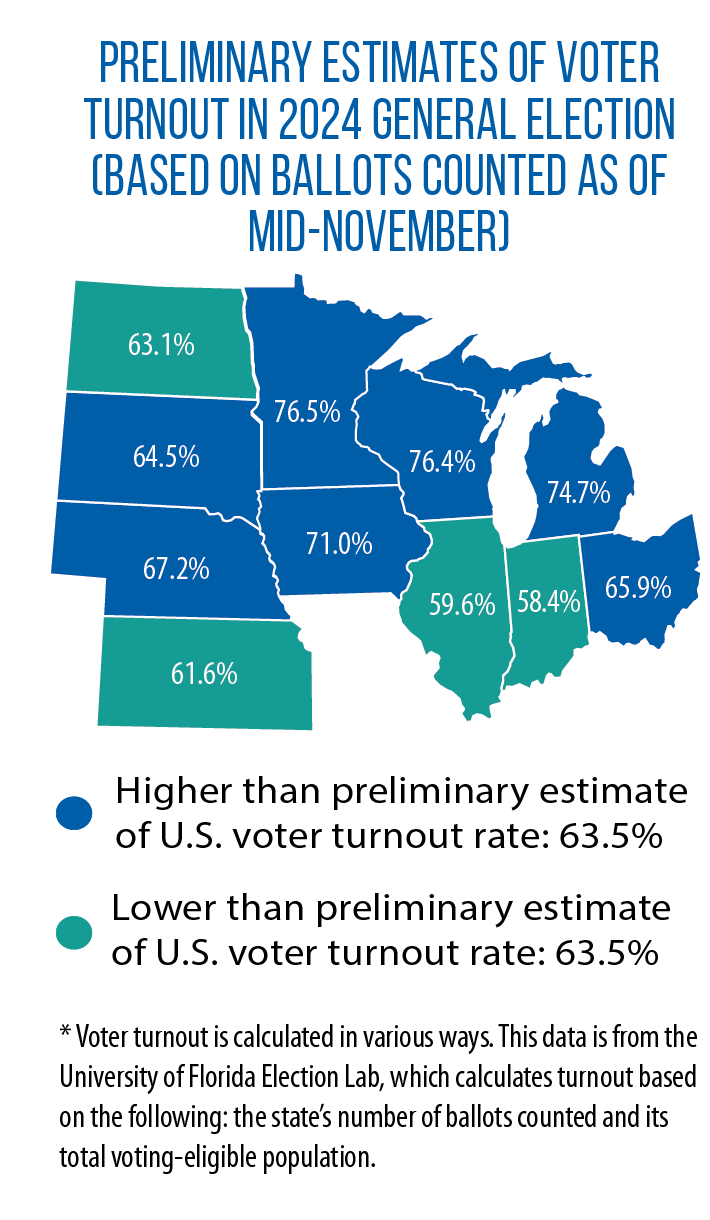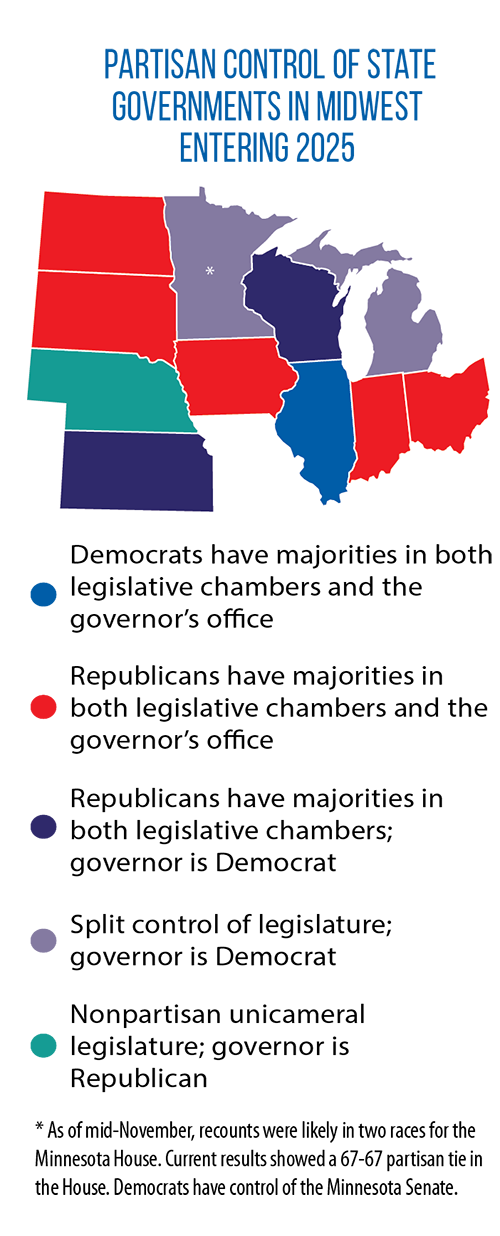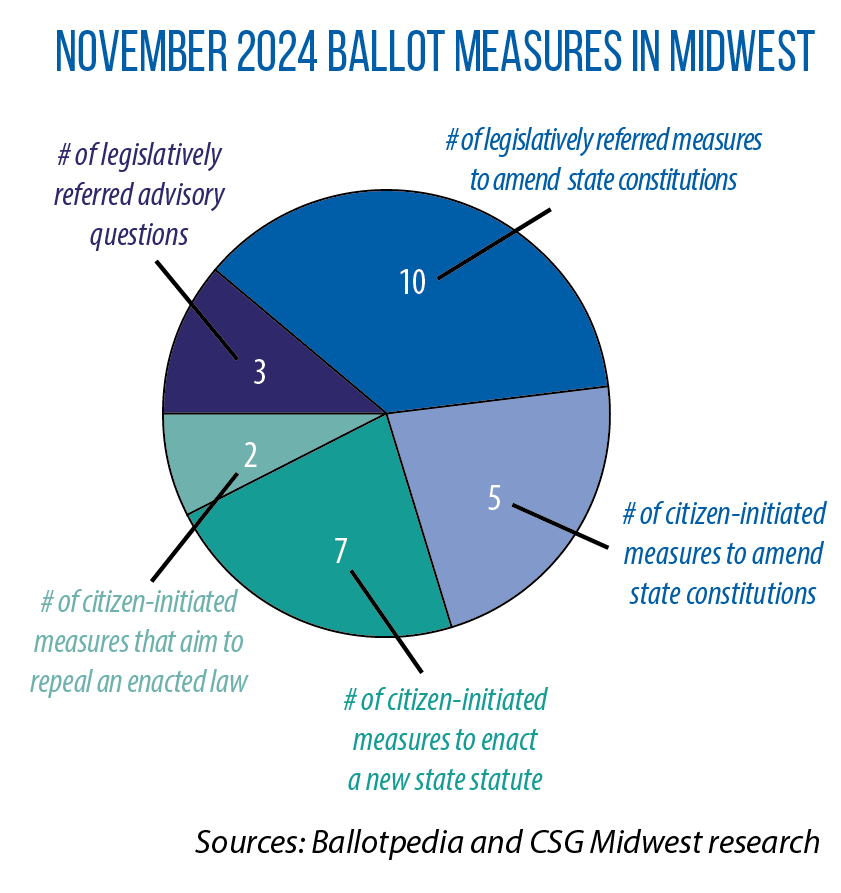Election wrap-up for the Midwest: Partisan shifts in two states, amended constitutions in seven
More than 1,200 state legislative races. Two elections for governor. Twenty-four proposals to amend state constitutions, enact new citizen-initiated statutes or repeal laws recently passed by state legislatures.
 A lot was at stake in the November 2024 elections across the 11-state Midwest, and turnout was high across much of the region. According to a state-by-state analysis by the University of Florida Election Lab, Minnesota, Wisconsin and Michigan led the nation in voter turnout, and Iowa, Nebraska, Ohio and South Dakota also topped the national average.
A lot was at stake in the November 2024 elections across the 11-state Midwest, and turnout was high across much of the region. According to a state-by-state analysis by the University of Florida Election Lab, Minnesota, Wisconsin and Michigan led the nation in voter turnout, and Iowa, Nebraska, Ohio and South Dakota also topped the national average.
Here is a look at some of the key results and takeaways from the 2024 elections.
Changes coming in Michigan and Minnesota
Entering this year’s election, one party fully controlled the legislature — majorities in both chambers — in every Midwestern state. (Nebraska has a nonpartisan unicameral legislature.)
That changes in 2025 as the result of Republican election gains in Michigan and Minnesota.
The GOP took control of the Michigan House and now has a six-seat advantage: 58-52. Democrats still have control over Michigan’s upper chamber (there were no Senate elections in 2024) as well as the governor’s office.
In Minnesota, a 67-67 split in the House appears likely for the session ahead, as the result of a three-seat gain by Republicans. (Two close House races were the subject of recounts as of mid-November). Democrats maintained control of the Senate, and Gov. Tim Walz is in the middle of his term.
According to Minnesota’s online legislative publication Session Daily, a tied House has only occurred one other time in the state’s history, in 1979. That year, a power-sharing agreement was reached between the two parties, with Republicans being given the speakership and Democrats one-vote majorities on key legislative committees.
 There has not been an evenly split legislature in the 11-state Midwest since the Iowa Senate in 2005. The power-sharing agreement there included the election of co-Senate presidents and co-committee chairs, one from each party.
There has not been an evenly split legislature in the 11-state Midwest since the Iowa Senate in 2005. The power-sharing agreement there included the election of co-Senate presidents and co-committee chairs, one from each party.
Soon after the elections in Minnesota, both House caucuses chose speaker-designates: Melissa Hortman for the DFL and Lisa Demuth for the Republicans.
Legislative supermajorities in six Midwest states
In contrast to the even split in Minnesota, many of the region’s legislatures will continue to be run by parties that enjoy supermajority status (three-fifths or two-thirds, depending on the state): Democrats in Illinois, and Republicans in Indiana, Iowa, Kansas, North Dakota and South Dakota.
The most lopsided partisan advantage is in South Dakota, where 91 percent of the legislative seats (96 of 105) are held by Republicans.
A legislative supermajority can provide procedural advantages to the controlling party in every state, but it is particularly important in Kansas, where Republicans control the Legislature and the governor’s office is held by Democrat Gov. Laura Kelly. By maintaining supermajorities in the Kansas House and Senate, Republicans can overturn gubernatorial vetoes via party-line votes.
In two legislative chambers, parties lost their supermajority advantage: Republicans in the Wisconsin Senate and Ohio House. Wisconsin had the region’s largest overall net shift in partisan control of legislative seats, with Democrats picking up 14 seats.
In 2025, Republicans will control about 63 percent of the 1,501 partisan legislative seats in the Midwest. This does not include Nebraska, where elections for the Unicameral Legislature are nonpartisan.
 However, this year’s results in Nebraska will mean a supermajority of members, 33 of 49, identify with the Republican Party. This status is important because in Nebraska’s one-house legislature, the filibuster, or the threat of one, plays an outsized role compared to most other U.S. state legislatures. A vote of 33 Nebraska senators can block filibuster attempts.
However, this year’s results in Nebraska will mean a supermajority of members, 33 of 49, identify with the Republican Party. This status is important because in Nebraska’s one-house legislature, the filibuster, or the threat of one, plays an outsized role compared to most other U.S. state legislatures. A vote of 33 Nebraska senators can block filibuster attempts.
Nebraska is one of six Midwestern states with a Republican governor. That number includes two governors elected for the first time in 2024: North Dakota’s Kelly Armstrong and Indiana’s Mike Braun.
Voter-approved changes to state constitutions, statutes
The 2024 elections resulted in state constitutions being amended in seven Midwestern states: Indiana, Iowa, Minnesota, Nebraska North Dakota, South Dakota and Wisconsin. In all, a total of 15 proposed constitutional amendments appeared on ballots across the Midwest.
Measures in Nebraska and South Dakota on the future of abortion policy and in Ohio on redistricting captured the most national attention.
 The results in Nebraska and South Dakota bucked recent national trends.
The results in Nebraska and South Dakota bucked recent national trends.
Since the U.S. Supreme Court’s Dobbs decision in 2022, ballot measures to protect or enshrine abortion rights have been approved by voters in 11 states, and prior to this year’s November elections, no such ballot proposal had been defeated.
However, South Dakotans rejected a measure that would have given a complete right to abortion during the first trimester and limited state-level restrictions later on in a pregnancy. As a result, a statutory ban on most abortions remains in place.
In Nebraska, competing proposals appeared on the ballot. Voters rejected an abortion-rights constitutional amendment and approved one that prohibits the procedure after the first trimester, with exceptions for medical emergencies or for pregnancies caused by sexual assault or incest. (The language of this amendment mirrors a bill passed by the Legislature in 2023.)
Ohioans were asked again this year to consider changes to the state’s redistricting process. Last decade, they approved a pair of measures that aimed to encourage bipartisanship and prevent gerrymandering, but still kept map-making powers with the General Assembly and a commission of elected officials. This year’s proposed constitutional amendment called for creation of a citizen-led, nonpolitician redistricting commission. Voters rejected the measure.
Here are other results from some of this year’s proposals to amend state constitutions, enact citizen-initiated statutes, or repeal laws recently enacted by state legislatures:
- North Dakotans rejected two citizen-initiated proposals, one to eliminate the property tax and another to legalize recreational marijuana.
- Indiana and Iowa voters modified constitutional language related to gubernatorial lines of succession.
- Minnesotans approved a legislatively referred constitutional amendment to continue using lottery-derived revenue to fund environmental and natural resources projects.
- Iowa and Wisconsin voters agreed to add new constitutional language that prohibits voting by noncitizens.
- Two citizen-initiated statutes were voted down in South Dakota: one prohibiting a sales tax on “anything sold for human consumption” and a second legalizing recreational marijuana. South Dakotans also rejected a proposed constitutional amendment to establish a nonpartisan primary system. They did approve a legislatively referred amendment authorizing work requirements for certain enrollees in the state’s Medicaid program.
- Nebraskans approved citizen-initiated statutes that legalize medical marijuana and ensure workers can earn paid sick time.
- According to Ballotpedia, Michigan, Nebraska, North Dakota, Ohio and South Dakota are among the 23 states nationwide that allow for a veto referendum. Under this process, voters have the opportunity to overturn a measure recently passed by the legislature and signed into law. This citizen-initiated veto authority was used in South Dakota to repeal a law on carbon pipelines and in Nebraska for a law providing tax credits for donations to private school scholarship programs.